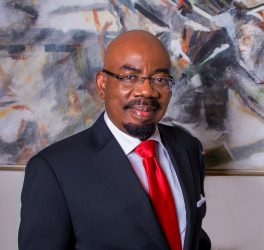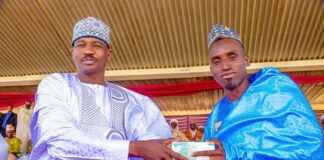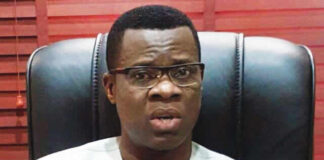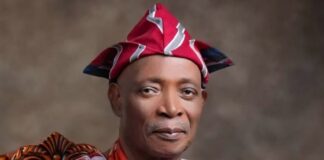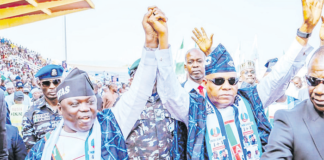- How A Level Head, Disciplined Lust, Contentment, Preserve His Strapping Repute
- What Many Moguls Could Learn From The Godfather of Banking
Jim Ovia embodies that rare Olympian faculty in man—that unusual, altruistic, and obstinate decency that spurs writers or philosophers to maintain scarce truths at the risk of death.
Some may liken it to that prodigious uprightness and fervent commitment to posterity that inspired the iconic words from Galileo about the planet Earth, even in the face of death: Eppur si muove (it moves all the same).
Ovia is undoubtedly a man of integrity. A symbol of immeasurable depth and magnetism, from young adulthood through middle age and now his wisdom years, Ovia’s repute has grown like an elm. And like the sturdy tree, it sprouts formidably.
The seasons pass, but Jim Ovia remains grand, like the nurturing guardian whose tenderness and warmth bless the land. There is no gainsaying that the Zenith Bank Chairman has blossomed into a man of great affluence and integrity, on whose watch and by whose grooming a league of brilliant, extraordinary high-achievers have bloomed across the boardrooms and transaction halls of significant banks in the country.
Most appreciable was his grooming and endowment of the country’s apex bank and regulator of the financial sector, the Central Bank of Nigeria (CBN), with Godwin Emefiele, among other high-ranking financial gurus.
However, It is worth noting that despite the familiar tumult and often unavoidable smudge pervasive of the banking sector, Ovia has managed to keep a clean reputation.
The ace boardroom strategist and entrepreneurial titan has attracted no scandal to his name; this is certainly a rare feat worthy of only a man of his standing.
Even though his protege and embattled former CBN governor, Godwin Emefiele, is currently facing prosecution for a slew of corrupt practices perpetrated during his tenure, it is noteworthy that his mentor, Ovia, has managed to keep his name off the sullied list of Emefiele’s accomplices.
The Zenith Bank chairman, according to informed sources, wisely kept his transactions clean and unsullied by any shady or underhand dealing with the Emefiele-led CBN.
The non-linkage of his name and bank is more appreciable, with the infamous Agbor connection wildly fingered as a significant enabler of Emefiele’s inglorious tenure as CBN governor.
According to Yusuf Babangida Sulaiman, a Kano State House of Assembly member, Emefiele’s actions as CBN chief were rife with nepotism, corruption, and shady political ambitions.
Sulaiman commented on his role in the naira redesign saga, saying, “We see the invisible hands of Godwin Emefiele as he seeks to perfect the path for his kinsman Sen. Ifeanyi Okowa, who, like Emefiele, hails from Ika, Agbor axis, Delta State, to become vice president of Nigeria under the PDP.”
Sources at the CBN confirmed that Emefiele is known for supporting his Agbor kin and doing their bidding at the apex bank. They claimed, for instance, that Emefiele exploited the naira scarcity to enrich his relatives, including Delta State Governor Ifeanyi Okowa, who ran for vice president under the Peoples Democratic Party (PDP) in Nigeria’s recently concluded presidential election.
Post-election, Ovia’s name is absent from the cohort mentioned as complicit in the so-called “Meffy Racket,” a well-funded syndicate analogous to the famous DasukiGate, a massive scandal involving the former National Security Adviser, Sambo Dasuki, during the 2015 elections.
Since 2017, the so-called Agbor Connection has been accused of being involved in several foreign exchange scandals reportedly supervised by Emefiele.
While it is an open secret that Emefiele has always been one of Jim Ovia’s boys and proteges in the banking sector, not a few people are stunned and impressed by Ovia’s capacity to shun the lure of seeking illicit gratification from his protege’s leadership of the CBN.
It would be recalled that Emefiele’s initial appointment by former President Goodluck Jonathan in February 2014 was controversial, especially since it came just hours after the suspension of his predecessor, Sanusi Lamido, as CBN governor.
Tongues wagged, albeit maliciously, as mischief makers alleged that Ovia had a hand in Emefiele’s appointment as CBN governor; this was hinged on the fact that Emefiele was previously installed as the Managing Director of Zenith Bank by Jim Ovia.
No sooner was he appointed as CBN governor than mischief makers allege that he was nominated for the position and subsequently installed by his former boss, Ovia.
Emefiele’s suspension and subsequent trial have been linked to a significant scandal involving the borrowing of $1 billion that occurred just before the inauguration of the new administration of President Bola Ahmed Tinubu.
Startling revelations have emerged, shedding light on Emefiele’s actions in obtaining the funds. It is alleged that on April 24, 2023, after the elections and in preparation for the May 29 inauguration, Emefiele borrowed $1 billion from Afrexim Bank.
Shockingly, within two days of receiving the money, $750 million (about $1 billion) was swiftly transferred to Aliko Dangote’s Dubai accounts using a Form A transaction.
These revelations have sent shockwaves throughout the nation, raising concerns about integrity, conspiracy, and potential abuse of power. It is claimed that Tinubu, then the new president-elect, was kept in the dark about this transaction.
The scale and method of the transaction are deeply troubling. Sources within the CBN revealed that Emefiele sold the dollars to Dangote at a meager rate of N445 per dollar.
While some CBN officials expressed concerns about these transactions, the revelations underscore the potential for money laundering and illicit activities within Nigeria’s financial system, casting a shadow on the CBN’s integrity during Emefiele’s tenure.
Emefiele, seeking a plea bargain in the criminal suit filed against him by the federal government, is facing a 20-count charge over an alleged conspiracy to carry out procurement fraud, among others.
In all of these and so many other shady dealings, Ovia has never been found complicit by anti-graft agencies or federal prosecutors.
Jim Ovia is one such godfather without a vile or corrupted vein in his bulk. Described as the ‘Godfather of Banking in Nigeria’ by Forbes Africa, Ovia is quite famous for his shrewd banking strategies and leadership skills.
A Forbes cover story on him says, “Banking is where he began life as a clerk; it was also the vehicle that carried him to his fortune.” But Jim Ovia had a life outside his banking career and has built businesses and mentored people.
Born on November 4, 1951, to the family of Obi Olihe of Agbor-Obi, in Agbor, Delta State, a series of early life challenges would have truncated his future, but for patronizing fate, he writes in his memoir.
According to him, “When I was just four years old, my father—who was in his mid-fifties—suffered a massive heart attack and died several weeks later due to inadequate medical facilities. Left to fend for herself and her family, my newly widowed mother called upon her intuitive entrepreneurial skills to set up her own small trading business.
“My oldest brother, who was almost twenty years my senior and working in Lagos, sent part of his wages home each month to help pay my school expenses.”
This made him realize the importance of education. It later became his motivation to establish James Hope College, a co-educational boarding school where 50% of the students are on scholarship.
Ovia attended Ika Grammar School in Bojiboji-Owa for his secondary education before joining Lagos to join his elder brother. While in Lagos, he started his banking career in 1973 as a clerk at Union Bank (formerly Barclays Bank), working at the Oba Akran Way, Ikeja branch. He worked as a bank clerk for three years before moving to the USA, where he obtained his bachelor’s and Master’s degrees.
He returned after his degree and rejoined the Union Bank of Nigeria’s branch at 121 Broadstreet, Victoria Island, for his National Youth Service Corps. After his service year, Ovia joined the International Merchant Bank (IMB) in 1980, working his way up from financial analyst to bank manager.
Ovia also worked with Merchant Bank of Africa, setting up the corporate division, and Lion Bank, where he rose to the post of branch manager in Lagos.
In the wake of the deregulation of the banking sector during the military administration of General Ibrahim Babangida in the late 1980s, Ovia applied for a banking license, alongside some investors, in pursuance of an ambition that led to the establishment of the Zenith Bank.
Zenith Bank started operations in 1990 in a residential building shared with a young couple on one wing and the bank on the other. As Ovia recalled, they converted the garage into a customer service unit. Then they made teller points out of the rooms to create the first branch at Ajose Adeogun Street, Victoria Island, Lagos. In time, the couple could no longer cope with the nuisance that came with being neighbours to a bank, and they moved out, giving the bank more space to operate.
From a single branch in a residential building, the bank now has hundreds of branches all over Nigeria and several subsidiaries in other countries. The bank became a Public Limited Company in 2001 and was listed on the Nigeria Stock Exchange (NSE), and later on the London Stock Exchange (LSE).
On April 27, 2007, Zenith Bank Plc became the first Nigerian bank in 25 years to be licensed by the UK Financial Services Authority (FSA), giving rise to Zenith Bank UK Limited.
The bank was 20 years old in July 2010, and ahead of time, Ovia had begun to plan his retirement. He was succeeded by Godwin Emefiele, one of his pioneer staff members who had grown through the ranks to become Deputy Managing Director and who would later head Nigeria’s CBN.
Ovia subsequently veered into real estate. He established the Lagos Civic Centre on the waterfront and also set up the Lagos Marriott Hotel, the Aquamarine Boat Club, and the Civic Towers, a 15-story office block.
Driven by his knowledge and interest in technology, he established Cyberspace Limited in 1995 to provide internet services, and later Visafone Communications Limited in 2007.
Visafone was later sold to MTN for an undisclosed sum in 2015, after it had gathered about 3 million subscribers. Ovia also founded Quantum Group, Inc., where his wife, Kay Ovia, is CEO.
Aside from his achievements in the banking and real estate sectors, Ovia is also notable for his philanthropic gestures. For instance, his Jim Ovia Foundation has four arms: the James Hope College, Jim Ovia Scholarship, Jim Ovia ICT Entrepreneurs Programme, and Empower Youth Programme, all of which engage in various aspects of human and societal development.
His charities have provided over 1,500 students with university scholarships, and more than 3,500 youths have benefited from his empowerment programmes since 2002, with over 500 entrepreneurs empowered with ICT skills.
Ovia is a member of the Governing Council of Lagos State University, the Digital Bridge Institute (DBI), and the National Economic Management Team of Nigeria, and a member of the Honorary International Investor Council and Board of Trustees at Redeemer’s University for Nations, Lagos.
He also chairs a number of boards, including the Nigerian Software Development Initiative (NSDI), the National Information Technology Advisory Council (NITAC), Quantum Markets Limited, and Cyberspace Network Limited.
His exceptional skills and achievements have been severally recognized, and he has received awards such as the Professional Leadership Award at the Zik Awards in 1999; Vanguard’s 20 Most Outstanding CEOs in Corporate Nigeria in 2002; the Lifetime Achievement Award at the African Bankers Award in 2015; and the prestigious Commander of Order of the Federal Republic of Nigeria, which he received in 2011.
His memoir, Africa Rise And Shine was presented in 2018 with all his business secrets and life philosophies. About it, Richard Branson said, “His story is a living testament to his message that success results when we act with courage and dare to try.”
Credit: The Capital NG

